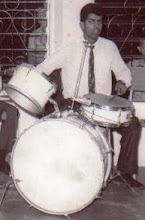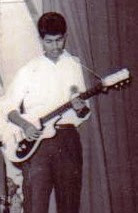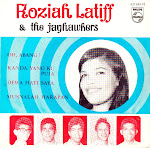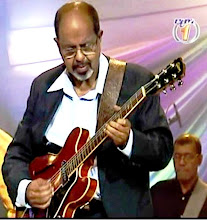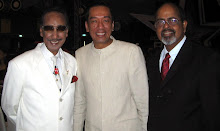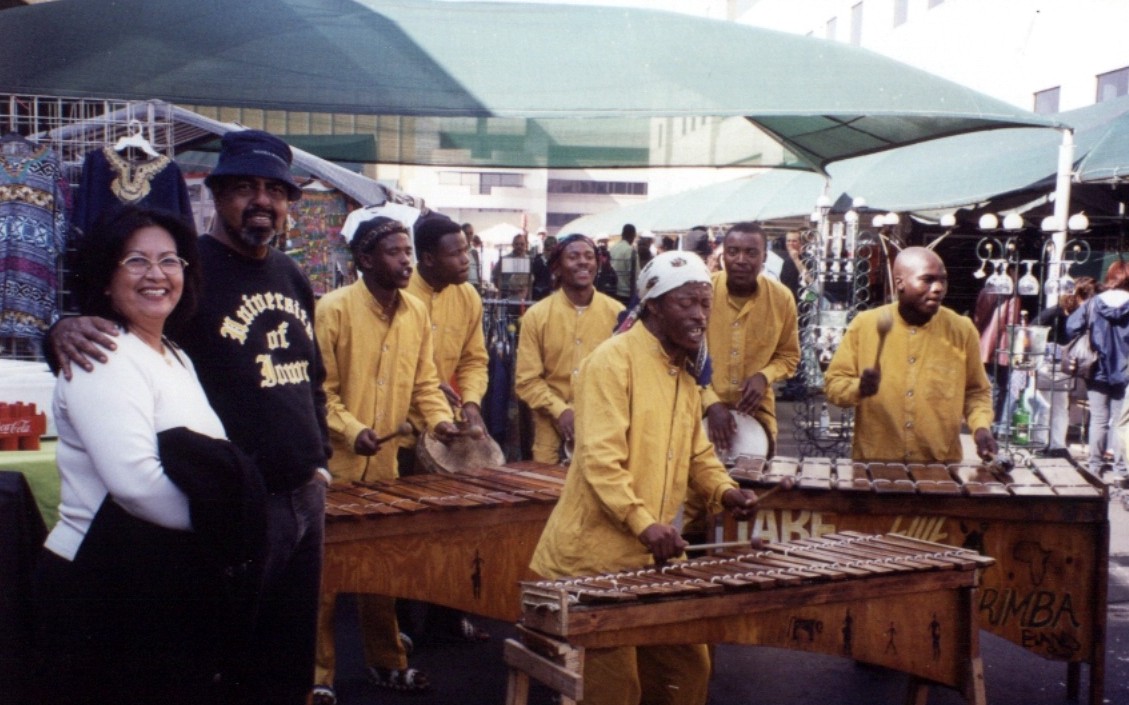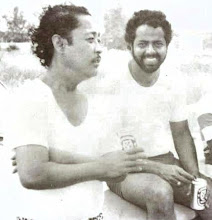
INTRODUCTION
Ladies and Gentlemen and fellow musicians and music educators. Assalamualaikum and Selamat Sejahtera.
It gives me great pleasure today to be able to present a paper before such an esteemed audience at this landmark occasion. I thank the National Arts Culture and Heritage Academy (Aswara), the Ministry of Unity, Culture, Arts and Heritage (KPKKWA), The Johore State Government and of course Majlis Gabungan Hiburan dan Kesenian Tanah Air (MAHKOTA) from the bottom of my heart for inviting me to present my views on how a sound music education program in schools and higher institutions can help improve the many problems in the music industry and develop an overall better musical culture and tradition in Malaysia today. More such forums on music in Malaysia are very badly needed to improve matters related to the prevailing musical culture in Malaysia today. However, mere forums can do nothing much unless the government itself initiates remedies and does something more concrete and menaingful about it. I must add here that our friends in the mass media too can play a truly big part in this matter to inform the masses.
I have been somewhat of a "voice in the wilderness" complaining about this or that in relation to the various facets of music and music education in Malaysia ever since 1987 when I returned from my music studies in USA where I was shocked to see how backward we were in music, particularly in music education. Many failed to see what I was complaining about but today many are beginning to see the light. Since then, I had written many articles of lamentation in the local English newspapers (NST and the Star) besides a book in Malay titled "Pendidikan Muzik Semasa" which is widely used in Malaysian IPTs till today. That's what I am told. Dewan Bahasa dan Pustaka has found no need to re-publish this book since the 2nd edition in 1995 nor to call me to discuss a new edition. They are too busy I suppose. As such the book is thoroughly photo copied by music students.
THE PROBLEMS
Poor music education that our young actually receive at all levels of the education process to my mind is the main cause for the many ills that we see in the music scene in Malaysia. Music fans today have begun to appreciate the artistes themselves more than the music that they deliver. It is more so in the Malay pop music scenario which is actually more of a cult culture wrongly identified with music appreciation. There is hardly any appreciation left for almost all forms of other music except the pop music variety. TV programs in the past featured traditional musics very regularly such as keroncong, dikir barat, boria, ghazal, asli and dondang sayang. Such programs from RTM have now become history. Some of you may not remember this sort of programs simply because you were either too young or were not born yet. An entirely new generation of radio and TV producers and deejays has cropped up who may not have themselves experienced the joys of music when they were in school and are a principal cause for this no traditional music situation to exist. Increasing commercialism in broadcasting has not helped either and is another significant cause. No one in the corporate world in his or her "right mind" rushes to sponsor any traditional or arts based music program on TV today in spite of much talk from them about corporate social responsibility.
Most Malaysians cannot sing the national or state anthem well today. Way back in the 1960's and 70's, we used to stand and sing the national anthem played at movie theatres, stadiums and even at the end of social functions when one could be quite intoxicated. What has happened to such aspects of the musical culture of the earlier Merdeka years? Why are the prominent composers of today steering clearly away from composing traditional, folk and patriotic songs? In the 1950's and 1960's the musical greats of the period like Jimmy Boyle, Alfonso Soliano, Dato Ahmad Merican, Johar Bahar, Dato Johari Salleh, Tony Fonseka and of course Tan Sri P. Ramlee himself all composed nationalistic flavored songs with hardly any financial incentives in mind. One such last patriotic effort was when Michael Veerapen and Paul Ponnudurai composed "One Thousand Million Smiles" for Sudirman to sing at the Royal Albert Hall in London way back in 1989. How many of us today can today confidently sing any of our beautiful patriotic songs like Putra Puteri, Tanah Pusaka, Cendering, Sg. Pahang, Titiwangsa, Gunung Kinabalu, Setangkai Mawar, Tanjung Bunga, Gunung Jerai and so on.
Music teachers from my generation taught such songs in the sixties and seventies. These songs were also aired through programs like Siaran ke Sekolah-Sekolah by RTM. There was a Pesta Muzik religiously held in every state annually. There were many national song writing contests organized as late as the 1990's. Such non-formal efforts to advance music and music education should have, logically speaking, progressed but developments in Malaysia especially since the KBSR era have, sad to say, almost totally negated such efforts.
By the 1980's our musicians and recording artistes had also made it overseas including Indonesia, Singapore and Brunei and were able to compete on par commercially with their artistes. One artiste organization (not from MAHKOTA) even organized a picket lately ito protest against the airytime given to Indonesian songs by local radio stations. Perhaps it would be a lot better to produce more quality music like the Indonesians and the Filipinos who have clearly overtaken us in this matter.
Yes, there was a more healthy culture of music consumption and music making with concerts held almost everyday in some part of Malaysia just about two decades ago. Concert promoters abounded in the 1980's and 1990's. Live music was dished out to the public instead of the minus one musical accompaniment that is so often used these days. We had live band contests on radio and TV that were judged by professionals instead of the highly commercialized SMS way that is much in vogue today. We even introduced a new brand of commercially viable religious Islamic music to the world - the Raihan brand of Nasyid music. Warner Music, headed by Dato Tony Fernandes, at that time had the vision to okay the first recordings of such music. Yes, we were on the right path and moving ahead. This is not so today. Where have we gone wrong? I believe that this situation has come about, as I have mentioned, because of no meaningful music education being given to our young at all levels of the Malaysian education process from kindergartens to colleges and universities.
IMPROVING THE SITUATION
Where have we gone wrong? Focused research is needed to answer such questions validly. It could come from the sociology and music departments in our own universities. I am yet to be enlightened by any such research published locally. Academics in the Malaysian government's think tank who advise the government could also do the same if they are not already doing it. They should be as it is also part of their job. Anyway, I doubt that there is anyone in the Malaysian think tank sufficiently qualified in the arts or music to do a valid and justifiable job. In any case, a few academics like Professor Dr. Tan Sooi Beng of USM and Dr. Minnie Ang have done some ethno-musical or music technology related writings that have been published mainly overseas. I understand that certain divisions of the Ministry of Education such as The Educational Planning and Research Division (EPRD) too have conducted some research but have never had it published and had instead cloaked it in secrecy. Why should this be so? Any worthy research should rightfully be in the public domain for open scrutiny and rebuttal. Highly regarded universities in developed countries are noted mainly for their never ending research and publications. We have questions in Malaysia that need researched answers and not mere opinions of legislators or education managers. If necessary, we should resort to expatriate academic investigation into this matter. There is nothing to be shy about. Even it if do have local music scholars to do so they are kept busy teaching more like high school teachers with very little aptitude, resolve, time, incentive or funds to engage in better research work.
We have brought in foreign expertise in other areas have we not? We have done so for developing sports in our country or improving our economics. A German consultant was brought in to assess the damage to our MRR2 just about two weeks ago. I can only think of one instance where an experienced Russian music professor was brought in to conduct the newly formed orchestra at University Putra Malaysia. Within a very short time, the students were performing even a Beethovenian piano concerto quite satisfactorily for a student orchestra at that. It shows that our students are capable but lack proper musical leadership. Sadly, his contract was terminated too soon and the orchestra, though still existing, is no where what it was under the Russian maestro's baton.
Of course we must not forget that we have brought in foreigners to man "our" Malaysian Philharmonic Orchestra (MPO) that is costing us a bomb to maintain since its formation in 1989. It is maintained by PETRONAS. But the MPO comprises almost entirely of foreign musicians and has least benefitted our own classical music performers since its inception. Many of us are still questioning the existence of such an orchestra and its relevance in Malaysia today. At best it perpetuates an elitist approach to music appreciation and benefits only a small concert audience who are mostly from the Klang Valley only.
Perhaps it would be a lot wiser to spend such money by bringing in music professors worth their salt from musically developed countries like Germany, Russia, Japan, UK or the USA to plan our music programs at all levels and also teach our students, teachers and lecturers. Such people can lead and inspire our locals to do a better job eventually with the spillover of their expertise. Such expatriates can also head the various levels of top educational management in music education in Malaysia for at least ten years while the locals shadow them and eventually take over. At the moment very junior music graduates are doing this if at all. Let us not be like Idi Amin who promoted himself from being a corporal to a five star general in his army when he kicked out all foreigners in his frenzied nationalistic mood. Today Uganda is one of the poorest countries in the world with a per capita income of RM 300 in spite of its rich natural resources.
When we started music education at the local universities we needed music lecturers, faculty heads and deans overnight. To solve the problem, we did an Idi Amin and placed very junior music educators who have had no more than a year's experience after getting their MAs or Phd. to fill such positions and life went on. What we had needed were experienced music educators and professors who could inspire students with their knowledge and research. We could have even brought in expatriate help at that point.
I also wish to draw a parallel here. In the 1950's, experienced graduates from Kerala in India were brought in to teach pure science and additional mathematics when such subjects were introduced. I was taught by them. We did not do an Idi Amin then. So today we have our own pool of well qualified math and science teachers at all levels of the education process. The same thing was done in the 1970's again when we wanted to introduce pure science and additional mathematics but in the national language. What did we do? We brought in experienced and senior Indonesian math and science teachers to do the job in the Malaysian schools and institutions like the MARA colleges. But in music education we have definitely started on the wrong foot. But it is never too late to rectify this and bring in such people at least as consultants.
WOES IN THE MUSIC INDUSTRY
More and more people directly involved in the industry have started complaining openly about the sad state of affairs in the music industry too. An anology is that of a person caught in a traffic jam and starts complaining about this and that without realizing that he or she is part of the cause of the jam. Recording companies, singers and composers complain because of their economic loss and deprivation. Music piracy which continues unabated is one such grouse. Original recordings get poorer sales. Some recording companies have stopped recording new albums and play around with compilation albums instead and have now resorted to the internet downloads to increase their annual gross sales figures. Some have simply shut down their operations. Leading music industry players have moved on to greener pastures including the aviation industry. Composers are accused of churning out low quality music with predictable melodies and lyrics but they in return argue that it is what the general Malaysian public wants. It is a "chicken and egg situation". Which comes first? The music industry players also argue that what the public wants the public gets. Can we blame them? Music is a business to them and commercial motives by far outweigh almost all other considerations such as musical literacy, aesthetics, diversified musical styles, nationalistic feelings and most importantly quality in music. As such the overall quality control is poor and a musically illiterate audience swallows everything "hook, line and sinker". Music reporters and critics also complain about this or that without first examining their own credentials.
Advances in music recording and reproduction have been very significant. With digital technology, pirated music sounds as good as the originals which are then cloned and sold for a fraction of the cost for the originals. There have been accusations of over pricing for original albums for music piracy to flourish. Prices were somewhat brought down with governmental intervention of the market forces but with no noticeable or significant results. There are still complaints that only one or two good songs can be found in an album while the rest of the songs are mere fillers. So why do we have to pay RM 20 or so for such albums argue consumers. Music pirates simply compile about twenty such "killer" hit songs and pack them into one album and sell them off at the rate of RM 10 for three CDs which the public then rush to buy. This is because the general Malaysian public clearly does not respect intellectual property nor is quality conscious. So where does the fault lie? One reason, I believe, is that such values are not being taught or inculcated in Malaysian schools, colleges and universities.
Toady, we see today better and more physical infrastructures in just about every facet of Malaysian life. Yes, in the commercial music sector, we have the latest state of the art digital equipment at broadcasting stations, commercial recording studios and for live entertainment. Yes we have better musical instruments. Yes, we have professional audio (PA) equipment in Malaysia that is world class and suited to even the world's top artistes. However, most public utility halls including those in schools and hotels have out-of-date sound equipment that had been installed with equally outdated specs and no one knows enough to complain about it. We have all attended wedding functions where the band and the sound system can drive us nuts and make us want to leave early. So much money is spent at such weddings for food, invitation cards, bridal attires and the bedroom décor. But when it comes to musical entertainment the cheapest band and sound system in town are employed without a blink of the eye. This badly affects the sales and rentals industry too which is often forgotten as being part of the music industry too. I believe it's because we have failed to educate Malaysians on what quality is all about in life including music.
How can we change this sort of mindset? I am sorry to say this bluntly but the KBSR & KBSM programs have failed to do so. Today, most Malaysians:
1. Are equally uninformed about almost all aspects of music except perhaps the personal details of their favorite singers through the mainly gossip based reports in the dailies and the broadcasting media. This is very obvious in the Malay pop music scenario.
2. Are incapable of serious or intelligent thought / discussion on any kind of music including their preferred variety. This can include music journalists too.
3. Think of music as purely serving a hedonistic or sensuous function and often associate it only with such concomitant modes of behaviors such as drinking, dancing, free sex and drugs and are most of the time totally ignorant of the many nobler outcomes that music can provide.
4. Have very narrow musical tastes with usually a distinct preference for the pop variety.
5. Increasingly give more priority to music as a visual art rather than an aural one.
6. Love Hindi songs passionately mainly because of the pretty / handsome faces who deliver the songs on the screen but fail to truly appreciate the brilliant manipulation of western musical instruments and harmonies that are made subservient to Indian ragas and talas by brilliant Indian composers like A.R. Rehman.
7. Look down on any non-European music especially if they happen to come from English speaking homes with a misguided notion that the only music worth studying or listening to should be music from the West - both from the present or from the past.
8. Are not bothered about copyrights and intellectual property resulting in widespread musical piracy.
9. Have not heard of patriotic songs such as “Pahlawan Ku” unless a pop singer like Siti Nurhaliza sings it a Merdeka Day programme.10. Cannot identify any musical instrument by its name - be it a Western or a non- Western one including Malay, Chinese or Indian instruments.
10. Are incapable of singing the national anthem or respective state anthem accurately.
11. Look upon formal musical notation as both cumbersome as well as not worth learning even if they happen to be professional musicians or singers preferring instead to play / sing “by heart” (by rote).I could go on and on but surely the aforesaid should be sufficient to illustrate my point.
BETTER MUSIC EDUCATION IS DEFINITELY THE ANSWER
Prominent people are also beginning to notice the educational imbalance in Malaysia. The good and learned Raja Muda of Perak, DYMM Raja Dr. Nazrin Shah, remarked on this problem directly when he said that that a system of evaluation in education which was overly inclined towards academic performance was contrary to the principles of nature and subjected educators to a blurred or short-sighted view, which made them fail to interpret the wider and more comprehensive educational philosophies. ('Recognize Non-academic talent’ - NST 29.6.08). Dr. Azly Rahman, who now teaches in the University of Columbia in the USA, is a respected Malay intellectual. In one of his articles, he warns us of the dangers of demonic music and suggests that its time for PETRONAS to help finance bands and orchestras in our public schools. Believe me when I say that I have seen all kinds of educational reforms and innovative attempts since the 1950’s. Music education too has had its fair share of changes.
The school goers from the 1950's and 60's generation (now mostly senior citizens) will remember some form of fun music activity in the classroom as well as choirs and marching bands which they had as co-curricular activity. From the early 1970’s specialist teachers in music were trained for this purpose at the Music Department of the Specialist Teacher Training Institute (STTI) now known as Institut Perguruan Ilmu Khas. The teachers chosen for the one year music course were not only qualified teachers in other subjects but also had clear musical abilities. Then came the compulsory label attached to music education with the introduction of Kurikulum Baru Sekolah Rendah (KBSR) in all primary schools in 1983. The music educators in Malaysia were overjoyed and welcomed this move. The status of music and what actually went on in the classrooms since 1983 with the introduction of KBSR music can even be said to have taken a backward step. The government per se on its part has spent perhaps billions by now to develop music and to be fair, has been quite consistent in this matter. However, something has gone seriously wrong in the implementation process though. Why?
I have several reasons to state here.
1. Till now, the higher levels of music education planning and management have always been in the hands of local non-music educators who are rarely in touch with reality.
2. An overall misunderstanding of what constitutes quality music education especially by such educational planners.
3. No meaningful expatriate expertise has been sought in the field of music education planning till now.
4. Poor or no meaningful coordination between the various divisions of the Ministry of Education.
5. Music educators in the lower rungs of education management tend to give a wrong impression of what is really happening to their superiors and even may hide weaknesses in the system to make everything and everybody look good.
6. Valid ideas from trained music educators are shot down by higher ranking educational managers and/or policy makers.
7. Poor quality control in the recruitment of music teachers resulting in non-musically inclined persons with "not so good" academic credentials being selected as trainee music teachers especially since the early KBSR days.
8. Non-music trained teachers are asked to teach music in the primary schools while music graduates in secondary schools are forced to teach non-music subjects.
9. Lack of basic musical competency among most music educators at all levels.
10. Some major misconceptions among the higher echelons of educational planning and management must include the following:
· Music education is not that important.
· Anyone can be trained to teach music - even the non-musical ones
· That Math and Science from the computational intelligence domain of the intellect are not important for a music teacher to function well.
MODEL THE SITUATION IN DEVELOPED NATIONS
It may be of interest to note that in developed countries like Germany and Japan it is mandated by the Ministry of Education that every child Grade 1-9 receives two hours (120 minutes) a week of sequential music instructions from a music specialist. This instruction takes place in all elementary and all junior high schools from its inception to its completion and is centered on the:
1. Appreciation of Music.
2. Expression or making music
Every school in Japan, for instance, is equipped with the instructional materials and instruments needed to enable the teachers to do their job thoroughly. These materials and equipments include song books, rhythm instruments, and a piano, a desk top keyboard for each student and many other supplementary teaching and learning aids. Each school building has a room exclusively dedicated to music instruction. Thus music is part of the school facility and not treated like an orphaned “anak angkat” as is the case in most Malaysian schools. Music is an integral part of basic education curriculum for the first nine years of schooling. In addition, optional music instruction for such as ensembles, choruses, band and orchestra are given at school after formal school hours. This preoccupation with music as centre and essential part of a young person school day is not exclusive to Japan. It exists in Germany too where each student receives a minimum of 90 minutes class periods per week in music from Kindergarten through 12th Grade. Norway and of course the USA would be other good examples amongst many of the countries with a major commitment to music in the public schools.
Only the Chinese medium schools in Malaysia can come anywhere near this type of educational approach because the philosophies of Confucius are held in high esteem in these institutions. The most famous saying of Confucius on music education might be:
“To educate somebody, you should start from poems, emphasize on ceremonies, and finish with music."
In other words, one cannot expect to become educated without learning music. However, I heard recently that our educational planners in the Ministry of Education are considering cutting down on the time allocation for music in the primary school from 120 minutes to a mere 30 minutes and combining music with the arts at that. I hope this remains a rumor for if it is true we are definitely going the wrong way.
SO WHAT CONSTITUTES A QUALITY GENERAL MUSIC EDUCATION PROGRAM FOR THE SCHOOLS?
A quality music education programme must be one that has a positive impact in educating a child holistically. This must be seen as observable behavior in all children irrespective of whether they are from the Arts or Science stream. Not everyone is born with music making capability but can be trained to appreciate and treasure music. Some outcomes of a quality general music education program therefore must have school leavers who can:
1. Sing with a reasonable sense of accuracy in rhythm and pitch.
2. Appreciate different kinds of music and styles.
3. Talk intelligently about music
4. Know that a great diversity of music and musical styles exist in the world both from the as
well as the present.
5. Use music as an essential tool for the wise use of leisure time throughout their entire lives.
6. Have some very basic understanding of different:
· Musical styles - traditional, ethnic, modern, world music etc.
· Musical Instruments - ethnic, orchestral as well as modern.
· Music notational systems
5. Use music as an essential tool for the wise use of leisure time throughout their entire lives.
6. Have some very basic understanding of different:
· Musical styles - traditional, ethnic, modern, world music etc.
· Musical Instruments - ethnic, orchestral as well as modern.
· Music notational systems
Clearly, music education provides the young child with another strong avenue for true overall success in the varied education process. The impact of a school music education curriculum can only be strong if there is real teaching and learning taking place. For this we need music teachers with at least basic musical competencies. Such is not the situation now. Please allow me to quote from The School Music Program: Description and Standards Music Educators National Conference, 2nd Ed, 1987 - USA as to why music is very important from the very early stages of formal education itself.
1. Music is just worth knowing as in music for music’s sake.
2. Music is one of the most important manifestations of our cultural heritage.
3. Music is a potential in every individual and like all other potentials should be developed to its fullest.
4. Music provides an outlet for creativity, self-expression and individual uniqueness.
5. It enables us to express our noblest thoughts and feelings.
6. Music teaches students about unique aspects of their relationships with other human beings and with the world around them, in their own as well as other cultures
7. Music opens avenues of success for students who may have problems in other areas of the curriculum.
8. Studying Music increases the satisfaction students derive from music by sharpening sensitivity, raising their level of appreciation and also expanding their musical horizons.
9. Music is one of the most powerful and profound symbol systems that exist.
10. Music helps students learn a significant lesson-that not all aspects of life are quantifiable
11. Music exalts the human spirit.
12. Music encourages analytical and divergent thinking.
Recent educational research on the nature of intelligence and brain function too gives promising indications that could change the face of education. Will listening to music make you smarter? Will learning to play a musical instrument make your brain grow larger than normal? Questions like these ones have been popping up all over the place in the past few years and not just in scientific journals either. Scientists have discovered that music training has significant influences on the brain development of young children leading to improved memory over the course of a year. The fact that musical training changes the way the brain reacts to music might not be very surprising, but researchers also found that the musically trained children performed better in a memory test that is correlated with other skills such as literacy, verbal memory, Visio-spatial processing and Mathematics. All such research suggests that music may act as a catalyst for cognitive abilities in other disciplines but more longitudinal studies are needed to confirm these findings. It is sad that in Malaysia educational planners seldom follow such innovations in educational thought. The ultimate goal of public music education should not be just to produce students capable of concert or popular music performances but one that will allow young people to participate and interact intelligently with music for their entire lives.
Nothing much has moved forward either since the KBSM music program was introduced for secondary schools. Despite having a significant increase in the number of graduate music teachers posted to schools graduating from the local universities in recent years, it is sad that any secondary school aspiring to introduce this new KBSM curriculum has to come up with its own funds. So if the school decides not to have a KBSM music program, trained music graduate teachers posted there are then asked to teach non-music subjects. What a waste and mismanagement of human capital. I believe that such teachers should be sent to the primary schools where there is a critical shortage of trained music teachers. The notion that graduates should teach only in secondary schools or higher institutions is also an outdated one. My son had a music educator with a Phd. teaching him at the kindergarten level in the USA in 1984. This is how backward our thinking has been all these years. It is abundantly clear that as the nation develops rapidly in other areas not enough parallel development is happening in the domain of the fine arts especially in the schools. The two Ministries of Education in Malaysia may want to seek "outside" help in such matters. Locally they can turn to MAHKOTA and other NGOs for the arts.
There is no doubt in my mind that music can play a pivotal role in society. Malaysian legislators and educators must themselves be first convinced that music education must have a core place in a reformed curriculum. In a multi ethnic, culture and religion country such as Malaysia where the population base is relatively young it is imperative that we re-examine the role of music education in the context of social development and also as an avenue for the wiser use of leisure time. The general Malaysian perception towards music education seems to be the main cause of all our problems and dissatisfaction in public and private music education. In this matter, I would like to put forth some views of the world renowned and eminent music educator Paul R. Lehman who is a Professor Emeritus at the University of Michigan, Ann Arbor in USA.
He says that the greatest threat to school music programs today comes from principals and other decision-makers who did not experience challenging and rewarding music programs themselves while in school. They don’t realize what a good music program can do for a child, for a school, and for a community. He also believes that it is not the central purpose of education, for example, to help the student to get a job. Professor Lehman also says that a nation is judged by posterity not by the strength of its army, or by its trade surpluses and deficits, nor by its students’ scores on standardized tests, but principally by its contributions to the arts and humanities. It is, according to him, the achievements of a civilization in the arts and humanities that remain when everything else is swept away by time. Music is not merely an adornment of life; it is a basic manifestation of being human.
It may surprise many of us that a holistic approach towards education is indeed the main intent and purpose of our National Education Philosophy (NEP). There have been no changes made to this philosophy. As a direct result of the NEP, music was formally introduced in the Kurikulum Baru Sekolah Rendah (KBSR) back in 1983. But 25 years down the line, the situation appears to have worsened. The working curriculum (i.e. the actual educational experiences children undergo at the school) has not been in congruence with this particular aspect of the NEP. The main problem clearly lies in the over-emphasis that has been placed upon children to achieve exemplary results in the public examinations by parents. Teachers have, over time, become accommodative of this trend and must also bear some blame.
In January 2007, The National Education Blueprint 2006-2010 was launched by the Prime Minister to lay the foundation for educational reformation to take place by identifying six thrusts – nation-building, developing human capital, strengthening national schools, narrowing the education gap, improving the teaching profession and accelerating excellence at educational institutions. Sadly, except for a mere mention of music in association with cluster schools, the role of music education is totally absent in all the six areas of thrust mentioned. Unlike KPKKWA which consulted a host of people including activists and NGOs concerned about music, theatre and drama before it came out with its Dasar Pembangunan Industri Muzik the National Education Blueprint did nothing of the sort and went on their own. So the arts are significantly absent in this blueprint. Professor Emeritus Dato' Dr. Khoo Kay Kim, the highly regarded and renowned academic had this to say of The National Education Blueprint.
"We do not need this blueprint to produce excellent students. What we need is a revival of the old education system... meaning the education system we had before 1957. That was when we saw dedication from the teachers. The Malaysian education system then was second to none in Asia. We did not have sports schools but we produced citizens who were Asian class, if not world class."
Maybe going back to 1957 may have been exaggerated a little for effect but a better and holistic education in the actual school situation delivered by talented and dedicated teachers is definitely what the young need. Achieving academic results by merely regurgitating facts in parrot fashion is not what constitutes good education. An immediate national long term strategy needs to be formulated to arrest this problem. I strongly believe that this can only be done by first reviewing the way in which our present education system itself is packed, administered and delivered.
CONCLUSION
In conclusion let me briefly state what I think needs to be done immediately. The present situation warrants a call for open discussion on the role of Music Education in the National Agenda which, in Malaysia, the government alone can prioritize and initiate. We need policy makers and educational planners to sit together with advisors from relevant Ministries such as KPKWA, arts activists and music associations ( such as MAHKOTA) as one body and re-define the function and role of music in society much beyond the entertainment level as a national policy and have it approved by the cabinet. Here are some basic guidelines that should help.
1. Music Education should never be elitist and considered relevant only for the affluent or musically gifted.
2. Music education must be seen as a basic right of every child to be given equal opportunity to develop skills and talents in the wide field of music.
3. Music should be viewed an aspect of our cultural heritage and it should be enjoyed and appreciated by every member of the community.
4. Music Education should be also promoted as catalyst for national integration in view of the multi-racial population in Malaysia.
5. Music Education should also be considered as part and parcel of the total integrated social development plan for the entire population.
Let me end with these wise words from that great Greek philosopher Plato.
"Music is a moral law. It gives soul to the universe, wings to the mind, flight to the imagination, and charm and gaiety to life and to everything. "
Thank you for your kind attention.



